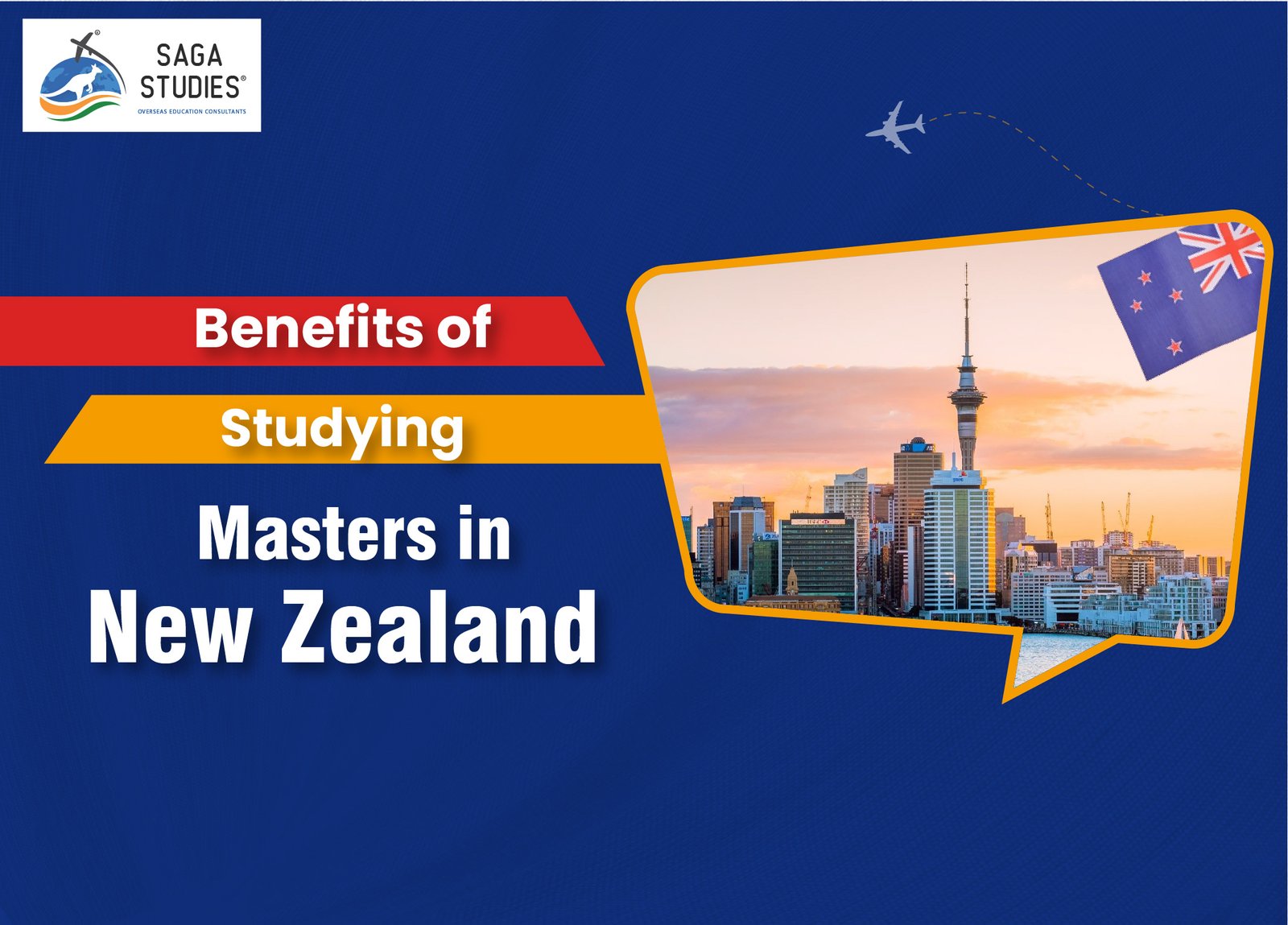New Zealand is an emerging destination for higher education, attracting students worldwide. With top-ranked universities, affordable tuition fees, and excellent job opportunities, pursuing a Masters in New Zealand can be a great decision for Indian students. This blog explores the eligibility criteria, benefits, tuition fees, scholarships, post-study work rights, and job prospects for students in New Zealand.
Eligibility Criteria to Study Masters in New Zealand for Indian Students
Indian students who wish to pursue a Masters in New Zealand must meet specific requirements. The key eligibility criteria include:
- A recognized bachelor’s degree with a minimum GPA/ CGPA requirement (varies by university and program although it’s recommended to have 4.0).
- English language proficiency through IELTS (minimum score of 6.5), PTE or TOEFL.
- Some programs may require relevant work experience or research proposals.
- A valid student visa for New Zealand.
Benefits of Studying a Master’s Degree in New Zealand
Studying a Masters in New Zealand offers numerous advantages:
- Globally recognized degrees with high academic standards.
- Research-focused programs designed to enhance practical knowledge.
- Safe, welcoming, and diverse student-friendly environment.
- Access to world-class universities with modern infrastructure.
- Strong industry connections, leading to excellent career prospects.
Student Benefits While Studying in New Zealand
As a Master’s student, you can enjoy multiple benefits, such as:
- Part-time work opportunities (20 hours per week) during studies.
- Access to student discounts on transport, entertainment, and medical services.
- Supportive academic environment with mentorship programs.
- Opportunities to participate in research projects and internships.
- Work rights for spouses of international students pursuing programs listed under the Green List. Recently, the New Zealand Government extended eligibility for work visas to partners of students studying Level 7 or 8 Bachelor’s Qualifications. This allows spouses to seek employment opportunities while their partner completes their education.
- Child education is fully funded by the NZ government for ages 5 and above*.
- Domestic fee apply to dependent children (T&C apply)
- Full time work rights along with studies for research students
*Maximum age limit depends on individual institution.
Post-Study Work Visa Rights
New Zealand provides post-study work rights, allowing graduates to stay and work for up to three years. The duration depends on the level of qualification and study location. A post-study work visa lets you gain valuable experience in your field and apply for permanent residency in the future.
Tuition Fees for Master’s Programs in New Zealand
A Master’s degree in New Zealand typically ranges from 18 months to two years. Some universities offer a one-year Master’s program for students with an equivalent post-graduate diploma or Bachelor’s (Honours) degree. To pursue a postgraduate diploma or degree in New Zealand, students may need up to NZ$ 46,752 as tuition fees. The annual living cost in New Zealand is NZD 20000.
Scholarships for International Students
New Zealand offers multiple scholarships to support international students pursuing their Master’s degrees. Below is a list of some prestigious scholarships:
| Scholarship Name | Award Value |
|---|---|
| Wellington International Excellence Scholarship | Up to NZD 20,000 towards the first-year tuition fee |
| University of Waikato International Excellence Scholarship | Up to NZD 15,000 towards the first-year tuition fee |
| Tongarewa International Scholarship (Victoria University of Wellington) | Up to NZD 10,000 towards the first-year tuition fee |
| New Zealand Excellence Awards (NZEA) | Up to NZD 10,000 towards the first-year tuition fee |
| University of Waikato Tauranga Bursary | NZD 10,000 (Applicable for the Tauranga campus & the first-year tuition fee) |
To be eligible for these scholarships, students must secure admission to the respective universities in New Zealand. It is crucial to check the eligibility criteria before starting the application process.
Pay Tuition Fees After Approval
A significant benefit for Indian students is the ability to pay tuition fees after receiving student visa approval. This reduces financial risk and ensures a secure payment process for students and their families.
Job Opportunities After Completing Masters in New Zealand
After completing your Masters in New Zealand, it is natural to seek international work experience. This valuable exposure enhances your career prospects significantly. New Zealand provides a post-study work visa for graduates, ranging from one to three years, depending on the level and location of study.
On average, Master’s graduates earn a base salary of up to NZD 73,000 per year. However, this figure can go much higher depending on job roles and companies. New Zealand offers strong career opportunities across various sectors, including:
- Engineering
- Information Technology
- Accounting and Finance
- Healthcare
- Construction Management
- Architecture
- Hospitality and Tourism
With a stable economy and a high demand for skilled professionals, New Zealand ensures promising job prospects. Additionally, if your qualification falls under the Green List Occupations, you may have better opportunities for permanent residency.
Conclusion
Studying for a Master’s in New Zealand provides Indian students with high-quality education, career prospects, and post-study work benefits. With affordable tuition, scholarships, and flexible visa policies, New Zealand is an ideal destination for higher studies. Start your journey today with Saga Studies Pvt Ltd and receive expert guidance for your education in New Zealand. If you need any guidance or have questions during the application process, our education experts are here to assist you every step of the way, ensuring a seamless admission experience.





I’m so grateful for your blog and the positivity it brings to my life. This post was filled with practical advice and a positive outlook that really resonated with me. It’s rare to find content that is both informative and uplifting, and you consistently deliver on both fronts. Keep up the amazing work! Please check my post at https://mazkingin.com
Thanks for reading and sharing your feedback. It truly motivates our team!
I have bookmarked your blog and refer back to it whenever I need a dose of positivity and inspiration Your words have a way of brightening up my day
We’re so glad you found it useful. Follow us for more updates on study visas
Thank you for always being open and honest with your readers It’s refreshing to see a blogger who is unafraid to be vulnerable and real
Thank you so much! We’re glad you found the blog helpful.
We just wanted to take a moment to acknowledge all the hard work and effort you’ve been putting in lately. Keep up the amazing job, you’re doing great!
Your feedback encourages us to create more valuable guides for aspiring international students.
Thank you for your kind words
This blog post is packed with great content!
We’re so glad you found it useful. Follow us for more updates on study visas
As a fellow blogger, I can appreciate the time and effort that goes into creating well-crafted posts You are doing an amazing job
As a fellow blogger, I can appreciate the time and effort that goes into creating well-crafted posts You are doing an amazing job
Thanks for reading and sharing your feedback. It truly motivates our team!
Thank you for creating such valuable content. Your hard work and dedication are appreciated by so many.
Thanks for your appreciation! At SAGA Studies, we aim to make study abroad information clear and reliable for all students.
Wow, this blogger is seriously impressive!
Your appreciation means a lot to us — thank you for your kind words
This is such an important reminder and one that I needed to hear today Thank you for always providing timely and relevant content
We’re so glad you found it useful. Follow us for more updates on study visas
I’m so grateful for your blog and the positivity it brings to my life. This post was filled with practical advice and a positive outlook that really resonated with me. It’s rare to find content that is both informative and uplifting, and you consistently deliver on both fronts. Keep up the amazing work! — please subscribe to my channel https://www.youtube.com/@jivoice?sub_confirmation=1
Thanks for your appreciation! At SAGA Studies, we aim to make study abroad information clear and reliable for all students.
This post truly brightened my day! I appreciate how you delve into the topic with such positivity and clarity. It’s refreshing to see content that not only informs but also uplifts the reader. Your writing style is engaging and always leaves me feeling inspired. Keep up the fantastic work!
We appreciate your kind words — stay tuned for more informative posts!
some times its a pain in the ass to read what blog owners wrote but this internet site is really user pleasant! .
thank you
keep in touch with us for more updates